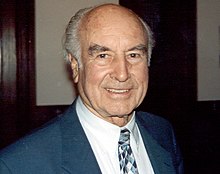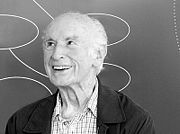Albert Hofmann
Albert Hofmann | |
|---|---|
 Albert Hofmann in 1993 | |
| Born | January 11, 1906 |
| Nationality | Swiss |
| Alma mater | University of Zürich |
| Known for | Synthesis of LSD-25 |
| Scientific career | |
| Fields | Chemist |
Albert Hofmann (born January 11, 1906) is a Swiss scientist best known for synthesizing Lysergic acid diethylamide (LSD). Hofmann authored more than 100 scientific articles and has written a number of books, including LSD: My Problem Child. On January 11, 2006, Hofmann became a centenarian, and was the focus of an international symposium on LSD.
Life
Hofmann was born in Baden, Switzerland, and studied chemistry at the University of Zürich. His main interest was the chemistry of plants and animals, and he later conducted important research regarding the chemical structure of the common animal substance chitin, for which he received his doctorate.
Discovery of LSD
Hofmann joined the pharmaceutical-chemical department of Sandoz Laboratories (now Novartis), located in Basel. He began studying the medicinal plant squill and the fungus ergot as part of a program to purify and synthesize active constituents for use as pharmaceuticals. While researching lysergic acid derivatives, Hofmann first synthesized LSD-25 in 1938. It was set aside for five years, until April 16, 1943, when Hofmann decided to take another look at it. While re-synthesizing the LSD, he accidentally consumed a small sample and serendipitously discovered its powerful effects. Three days later, on April 19, 1943, Hofmann deliberately consumed 250 micrograms of LSD before his bicycle ride home. This was followed by a series of self-experiments conducted by Hofmann and his colleagues. He first wrote about these experiments on April 22 of that year.
Further research
I think that in human evolution it has never been as necessary to have this substance LSD. It is just a tool to turn us into what we are supposed to be.
— Albert Hofmann, [1]
Hofmann became director of the natural products department at Sandoz and went on studying hallucinogenic substances found in Mexican mushrooms and other plants used by the aboriginal people. This led to the synthesis of psilocybin, the active agent of many "magic mushrooms."[2] Hofmann also became interested in the seeds of the Mexican morning glory species Rivea corymbosa, the seeds of which are called Ololiuhqui by the natives. He was surprised to find the active compound of Ololiuhqui, ergine (lysergic acid amide), to be closely related to LSD.
In 1962, he and his wife Anita traveled to southern Mexico to search for the plant "Ska Maria Pastora" (Leaves of Mary the Shepherdess), later known as Salvia divinorum. He was able to obtain samples of this plant but never succeeded in identifying its active chemicals which science has now identified as the diterpenoid Salvinorin A.

In 1963, Hofmann attended the annual convention of the World Academy of Arts and Sciences (WAAS) in Stockholm.
Hofmann calls LSD "medicine for the soul" and is frustrated by the worldwide prohibition that has pushed it underground. "It was used very successfully for 10 years in psychoanalysis," he said, adding that the drug was hijacked by the youth movement of the 1960s and then unfairly demonized by the establishment that the movement opposed. He concedes LSD can be dangerous in the wrong hands.[3] Hofmann was due to speak at the World Psychedelic Forum[4] from March 21 to March 24, 2008 but was forced to pull out due to poor health.
In December 2007, Swiss medical authorities permitted a psychotherapist to perform psychotherapeutical experiments with patients who suffer from terminal stage cancer and other deadly diseases. Although not yet started, these experiments will represent the first study of the therapeutic effects of LSD on humans in 35 years, as other studies have focused on the drug's effects on consciousness and body. Hoffmann supported the study, and continues to believe in the therapeutic benefits of LSD.[5]
See also
References
- ^ "LSD: The Geek's Wonder Drug?". Retrieved 2007-08-25.
- ^ Bleidt, Barry (1996). Clinical Research in Pharmaceutical Development. Informa Health Care. pp. 36, 42–43. ISBN 0824797450.
{{cite book}}: Unknown parameter|coauthors=ignored (|author=suggested) (help) - ^ "New York Times article".
- ^ "World Psychedelic Forum".
- ^ "The comeback of LSD - swissinfo.ch".
External links
- Albert Hofmann (NNDB)
- Erowid: Albert Hofmann Vault
- Albert Hofmann Foundation
- MAPS ("Stanislav Grof interviews Dr. Albert Hofmann")
- Top 100 Living Geniuses
